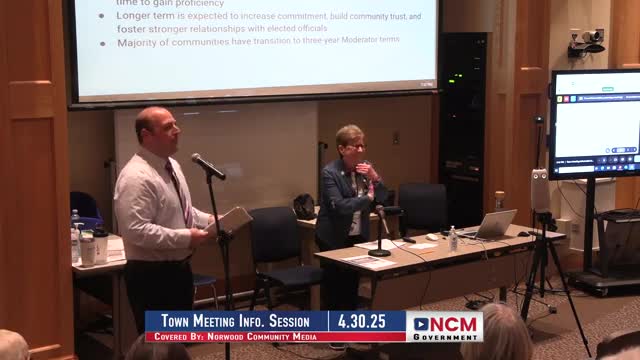Norwood previews 10 articles for Special Town Meeting No. 2, including solar PILOT, veteran tax options and procurement rule changes
Get AI-powered insights, summaries, and transcripts
Subscribe
Summary
At an information session town officials reviewed the 10 articles to be considered at Special Town Meeting No. 2 (anticipated May 15), covering moderator term length, a solar payment-in-lieu-of-taxes deal, HERO Act veteran exemptions, procurement changes, floodplain code updates and zoning clarifications.
Town of Norwood officials reviewed the 10 warrant articles scheduled for Special Town Meeting No. 2, expected to convene May 15, and answered preliminary questions from members.
Moderator term: Article 1 would change the elected moderator's term from one year to three years. Jerry Slater, the town moderator, told members the change aims to reduce turnover and allow moderators more time to master the role; the change would require town meeting approval and subsequent legislative approval because the moderator's term derives from the special act establishing Norwood's representative town meeting. Slater said he will appoint a temporary moderator to preside over that article so he can speak on it without presiding.
Landfill solar / PILOT: Article 2 proposes a payment-in-lieu-of-taxes (PILOT) agreement with Tangent Development LLC to install and operate solar arrays on town-owned landfill property. The agreement as described in the session would base payments on full and fair cash value of equipment (excluding town-owned land) and the negotiated package discussed by the light department planned to yield roughly $481,000 in payments spread over 25 years. Town staff said equipment maintenance and site details are covered in the contract under negotiation; several members asked about the company's identity, whether the project went to bid, who maintains vegetation inside fenced areas and decommissioning/removal responsibilities at contract end. Town staff said they would provide answers and contract language for town meeting.
HERO Act veteran exemptions: Articles 3 and 4 would accept optional clauses in the 2024 HERO Act (Acts of 2024, ch.178) to increase veteran property tax exemptions: clause 22(i) would permit an annual cost-of-living adjustment to the existing veteran exemption (mirrored for some senior exemptions) and clause 22(j) would add an optional additional exemption percentage. Town staff said the combined change would affect roughly 203 veterans under the cost-of-living provision and might extend benefits to roughly 65 additional veterans under the optional exemption; the pair of changes is estimated to cost about $75,000 per year to the town and would not be state-reimbursed.
Direct deposit authorization: Article 5 would formally adopt M.G.L. c.41, s41B (direct deposit authority) for the town; town staff said Norwood has used direct deposit operationally for decades but the adoption would codify the authority in town meeting records.
Five-year contracts: Article 6 would authorize up-to-five-year contracts for certain services (transportation, food service, energy solutions and similar procurements) where multi-year deals can yield better pricing. Under state procurement rules the default cap is three years; town meeting authorization would permit the longer term for specified categories. Town staff said prior contracts have benefited from five-year terms and that nonperformance and termination language would remain part of any contract.
Floodplain overlay update: Article 7 updates the town's floodplain overlay district to align with changes to FEMA maps and the National Flood Insurance Program (NFIP). Sarah Dixon, director of community development, said most model language is supplied by the state and FEMA and the town must adopt complying local regulations by early July to maintain NFIP participation. Dixon said updated GIS layers are available and staff will follow up on parcel-level impacts and communications to affected property owners.
Nonconforming structures: Article 8 proposes an amendment to section 5.4 of the zoning bylaw governing preexisting nonconforming one- and two-family residential structures. The proposal would (a) require a variance where a proposed project would create a new dimensional nonconformity, and (b) raise the habitable-floor-area threshold that requires ZBA special-permit review from 25% to 75% in many cases. Planning and building staff said the change aims to reduce routine cases going to the ZBA while reserving board review for projects that create new nonconformities or materially affect neighbors; staff agreed to provide illustrative parcel-level examples before town meeting.
Kennels and MBTA overlay: Article 9 fills a technical gap left when the MBTA Communities multifamily overlay district and kennel use rows were added to the bylaw. The article clarifies that commercial and personal kennels are not allowed in the MBTA Communities multifamily overlay district.
Boston Providence Highway (Route 1) multifamily clarification: Article 10 seeks to clarify that multifamily housing is permitted only within the designated mixed-use overlay districts (NUODs) inside the Boston Providence Highway (BPH) zoning district, and not generally across the entire BPH district. Planning staff said the intent is to preserve the original limits discussed when the BPH and MUODs were created.
Next steps: Town staff said these articles will appear on the May 15 special town meeting warrant; motions with precise language and dollar amounts (where applicable) will be presented on the meeting floor. No votes were taken at the information session; staff committed to providing contract language, parcel maps and other clarifying materials in advance of town meeting.
